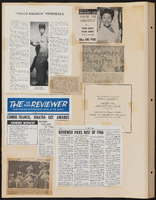Search the Special Collections and Archives Portal
Search Results
Transcript of bus tour of "Jewish Las Vegas" by Temple Beth Sholom, May 17, 2015
Date
Archival Collection
Description
Temple Beth Sholom organized and led a bus tour of parts of Las Vegas that are significant in local Jewish history. Stops on the tour included Woodlawn Cemetery and the former Temple Beth Sholom campus on Oakey Boulevard. Narrator Arlene Blut gives the overview of the Jewish community, and Rabbi Felipe Goodman talks to tour participants at the cemetery. Former Las Vegas mayor Oscar Goodman speaks at the old synagogue along with Josh Abbey, whose mother created the stained glass windows at the temple.
Text
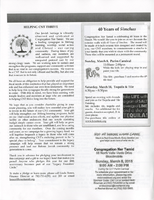
Newsletter from Congregation Ner Tamid, March 2015
Date
Archival Collection
Description
Newsletter from Congregation Ner Tamid, March 2015
Text

Epilogue: UNLV Yearbook, 1970
Date
Description
Yearbook main highlights: schools and departments; detailed lists with names and headshots of faculty, administration and students; variety of photos from activities, festivals, campus life, and buildings; campus organizations such as sororities, fraternities and councils; beauty contest winners; college sports and featured athletes; and printed advertisements of local businesses; Institution name: University of Nevada, Las Vegas
Mixed Content

Meeting minutes for Consolidated Student Senate University of Nevada, Las Vegas, March 22, 1990
Date
Archival Collection
Description
Text
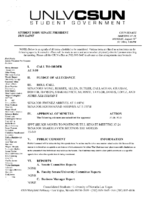
Meeting minutes for Consolidated Student Senate, University of Nevada, Las Vegas, August 13, 2007
Date
Archival Collection
Description
Text
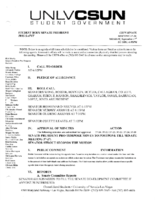
Meeting minutes for Consolidated Student Senate, University of Nevada, Las Vegas, September 17, 2007
Date
Archival Collection
Description
Text

Meeting minutes for Consolidated Student Senate, University of Nevada, Las Vegas, December 03, 2007
Date
Archival Collection
Description
Text
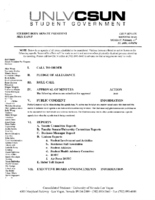
Meeting minutes for Consolidated Student Senate, University of Nevada, Las Vegas, February 11, 2008
Date
Archival Collection
Description
Text
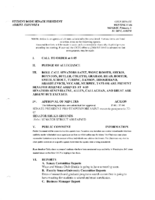
Meeting minutes for Consolidated Student Senate, University of Nevada, Las Vegas, February 05, 2007
Date
Archival Collection
Description
Text

